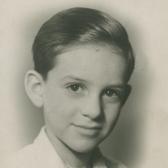
-
Learn More about Peter
- Echoes of Memory Read Peter's writings
- First Person Watch Peter share his Holocaust experiences at a First Person program
- Oral History Access Peter's Oral Testimony
Peter Gorog was born Péter Grünwald in Budapest, the capital of Hungary, on March 10, 1941. Peter’s father, Árpád Grünwald, worked as an office manager at the Franklin Publishing House, and his mother, Olga Schönfeld, was a hat-maker.
The persecution of Hungarian Jews in the interwar years began with the 1920 Numerus Clausus Act, which restricted the number of Jews who could be admitted to higher education. Árpád, who aspired to be a lawyer, could not study law under the discriminatory quota system.
The Hungarian government enacted increasingly oppressive antisemitic laws and policies, including forced labor battalions and labor camps. In August 1940, Árpád was conscripted into a forced labor battalion along with thousands of other Jewish men considered undesirable for armed service by the Hungarian government. He had to leave Olga, who was pregnant with Peter, for months at a time. Árpád was home for Peter’s birth in March 1941. Following Peter’s birth, Árpád was only able to see him on brief visits home. His last visit home was March 1942. After that, the Hungarian government sent Árpád to occupied Ukraine with a labor battalion, where he was given little food or clothing during the harsh winter. Árpád was reported missing by the Red Cross in January 1943. Olga was later told that Árpád was left behind when Hungarian forces were retreating from the advancing Soviet troops. Árpád presumably froze to death.
Olga supported the family through income from her hat-making until she was forced out of the apartment that also served as her millinery shop. German forces invaded Hungary in March 1944, and the Hungarian government ordered the Jews of Budapest to move into a “csillagos ház,” meaning “a house marked with a yellow Star of David.” Olga and Peter, carrying only one suitcase of clothing and valuables, found refuge with a distant family member who had converted from Judaism to Christianity in one of these yellow star houses.
In October 1944, the Arrow Cross party gained control of the Hungarian government and began a reign of terror against the Jews in Budapest. Olga was arrested by the Hungarian gendarmerie and taken to the Mosonyi Street Jail. She was released after three weeks, and the family moved into an internationally protected apartment. Then in late 1944, on Arrow Cross orders, Olga and Peter moved to the Budapest ghetto, where they lived near Peter’s grandparents, two aunts and a cousin. They spent most of their time in the basement during the frequent Allied air raids. After weeks of fierce fighting, the Budapest ghetto was liberated by the Soviet Army in January 1945. Olga and Peter made trips to the countryside to barter jewelry for food. Despite their efforts to feed the family, Peter’s grandparents died of illnesses exacerbated by malnutrition and lack of medical care a few months after liberation.
Peter grew up in Communist Hungary and changed his family name in 1962 from Grünwald to Gorog for fear of antisemitic discrimination. He earned a Master of Science degree in electrical engineering and later participated in the design of the first Hungarian-made computer. He defected to the United States in 1980, where he worked on various NASA projects such as GOES, LANDSAT, Hubble, and the James Webb Space Telescope. Peter retired in 2014. He and his wife have five daughters. Peter is a volunteer at the United States Holocaust Memorial Museum.
